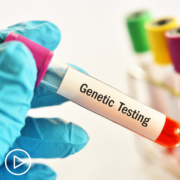Key Considerations When Making Metastatic Breast Cancer Treatment Decisions
Key Considerations When Making Metastatic Breast Cancer Treatment Decisions from Patient Empowerment Network on Vimeo.
Making metastatic breast cancer treatment decisions involves weighing key factors. Dr. Jane Lowe Meisel shares important considerations that aid in choosing the best treatment for an individual patient.
Jane Lowe Meisel, MD is an Associate Professor of Hematology and Medical Oncology at Winship Cancer Institute at Emory University. Learn more about Dr. Meisel here.
See More From INSIST! Metastatic Breast Cancer
Related Resources:

Which Metastatic Breast Cancer Treatment Is Right for You? Guide |

Factors That Guide a Metastatic Breast Cancer Treatment Decision |

|
Transcript:
Katherine:
Yeah. Yeah. So, what factors are considered when deciding on the best treatment approach for an individual patient?
Dr. Meisel:
So, I think certainly the tumor type that we were talking about. Is it estrogen-positive or HER2-negative or HER2-positive?
I think response to past treatments, both in terms of if someone has had metastatic disease for a long time and has had a few treatments already, how long did they respond to those treatments and how completely did they respond to those treatments?
Did they have stable disease for a while, or did their cancer actively shrink?
And then I think other than that, it would be some of the things I touched on. Side effect profiles. Do patients have pre-existing neuropathy from other chemotherapy? If so, maybe you want to avoid a regimen that causes more neuropathy. Schedule. Some patients, it’s really important to be on a certain schedule, as opposed to a different schedule. I think whether there are clinical trials available instead of whatever the standard of care regimen would be is also important.
Because for some patients who are interested in pushing the envelope or who might be a great candidate for a particular trial, if there is one that they’re a candidate for that’s not horribly inconvenient from a logistics standpoint, then trials I think are also a great option to consider. So, I think from an effectiveness standpoint, you want to think about the tumor type response to past treatments. And then potentially, if the patient has had, what we call genomic profiling, where the tumor has been sent for basically genomic analysis, to see what genes might be mutated in the tumor that could potentially drive a response to a newer, different therapy.
All those things can be taken into account as we think about the cancer. But then there are the patient-specific factors, and I think those would be mainly side effects, schedule, clinical trials and desire or not to pursue those. And then, just what the patient’s perspective is on the plan that you’re offering them.



